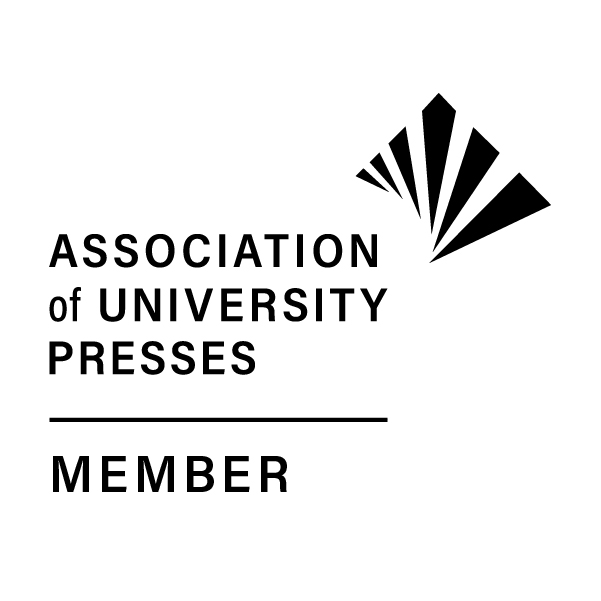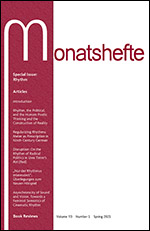Monatshefte
Volume 98, Number 2, Summer 2006 Table of Contents
Special Issue: The Art of Healing
Articles
Marc Silberman
Guest Editor’s Note
Ben Singer
Introduction: Modernism, Modernity, and the Senses
David J. Levin
Interstitial Redemption: Wagner’s Tannhäuser and the Dramaturgical Vicissitudes of Music Drama
Abstract:
Wagner’s published writings repeatedly model a motivating tension between spectacle and narrative, attraction and absorption, grand opera and German romantic opera. The recurring terminological clusters provide a suggestively bifurcated aesthetic field on which to launch the project of music drama, which sees itself as a sublation of these oppositions. More important, Wagner’s stage works repeatedly allegorize this aspiration, rendering the bipolar appeals and manifest shortcomings of spectacle and absorption to clear the way for the advent of Wagner’s own aesthetic practice. To probe this point, the article focuses on a particular movement in Tannhäuser, the shepherd's song in act 1, which serves as a marginal—and interstitial—beacon of expressive authenticity. As such, it stands apart from—and arguably heralds an alternative to—two distinct and much more powerful musical cultures portrayed in the work, one excessively pleasurable, the other drastically bureaucratic. (DJL)
Brian Hyer
Response to David J. Levin
Lutz Koepnick
Rilke’s Rumblings and Lang’s Bang
Abstract:
This article explores what it might mean to be a modern listening subject. Based on close readings of a short passage in Rainer Maria Rilke’s novel Die Aufzeichnungen des Malte Laurids Brigge (1910) and of the opening sequence of Fritz Lang’s film M (1931), I argue that what made modern hearing modern was its ability to recognize the essential messiness, instability, and potential failure of sensory perception in modernity. Confronted with fundamental ruptures between the acoustical and the visual in industrial society, listeners became modern to the extent to which they learned how to negotiate conflicting sensual input and abandon traditional visions of perceptual wholeness and unity. (LK)
Marc Silberman
Response to Lutz Koepnick
Oksana Bulgakowa
The Ear Against the Eye: Vertov’s Symphony
Abstract:
According to Vertov, media-induced perception (the Cine-Eye and the Radio-Ear) trains modern eyes to see simultaneity and speed and modern ears to register non-tempered sounds (industrial and urban noises). His position recalls Futurist programs and discussions in Russian circles that elaborated the distinction between music, sound, and noise. Vertov structured his first sound film, Enthusiasm (1931), however, as a four-movement symphony with a specific musical narrative that employs the principles of repetition, variation, contrast, and counterpoint of visual and acoustic leitmotivs. Vertov developed transformed noises into a musical symphony by using montage and varying the speed of recorded sounds in post-production. The notion of a new kind of hearing as staged in Vertov’s film may be interpreted as an appeal to a new sensuality and to new bodily experiences, an appeal to create a utopian, “techno-equipped” human being endowed with cine-eyes and radio-ears who deveolps a synaesthetic apperception of the fragmented world of modernity. (OB)
David Bordwell
Response to Oksana Bulgakowa
Justus Fetscher
Blindness and “Showside”: Non-Visual Aspects of German Radio and Radio Plays in the 1950s
Abstract:
The connections and gaps between modes of sense perception played a role in 1950s West German broadcasting media and more specifically in the genre of the radio play. Radio programs possess a fantastical quality insofar as their acoustic suggestiveness cannot and does not rely on visible evidence. This explains the radio play’s predilection for plots set in a dream-like, surreal, and dark realm. The world without light of the radio broadcast and the blindness of those listening complement one another. In post-war West Germany, the widely held link between the radio play and blindness assumed a new meaning as the war blind became symbolically and institutionally the defining core of an audience intensely listening to the radio plays’ inner voices. A close reading of Günter Eich’s two versions of Blick auf Venedig (1952, 1960) both confirms and destabilizes this link. His blind characters are aliens in the world of social conventions, which puts them on par with the author Eich, who in poetological statements has sketched out a kind of poetics of blindness. (JF)
Sabine Gross
Response to Justus Fetscher
Review Article
Hans-Christian von Herrmann
Stimmen hören
Book Reviews
Alter, Nora M. and Lutz Koepnick, eds., Sound Matters: Essays on the Acoustics of Modern German Culture (Hans-Christian von Herrmann)
Bassler, Moritz und Ewout van der Knaap, Hrsg., Die (k)alte Sachlichkeit. Herkunft und Wirkungen eines Konzepts (Eric Jarosinski)
Bühler-Dietrich, Annette, Auf dem Wege zum Theater (Jennifer Redmann)
Bultmann, Christoph, Die biblische Urgeschichte in der Aufklärung. Johann Gottfried Herders Interpretation der Genesis als Antwort auf die Religionskritik David Humes (Heinrich Clairmont)
Carlson, Allen and Arnold Berleant, eds., The Aesthetics of Natural Environments (Christoph Weber)
Costabile-Heming, Carol Anne, Kristie A. Foell, and Rachel J. Halverson, eds., Berlin—The Symphony Continues: Orchestrating Architectural, Social, and Artistic Change in Germany’s New Capital (Jost Hermand)
Epping-Jäger, Cornelia und Erika Linz, Hrsg., Medien/Stimmen (Hans-Christian von Herrmann)
Feinstein, Joshua, The Triumph of the Ordinary: Depictions of Daily Life in the East German Cinema, 1949–1989 (Stefan Soldovieri)
Gentry, Francis G., ed., A Companion to the Works of Hartmann von Aue (Joseph Sullivan)
Institut für Neue Musik und Musikerziehung, Hrsg., Stimme. Stimmen—(Kon)Texte, Stimme—Sprache—Klang, Stimmen der Kulturen, Stimme und Medien, Stimme in (Inter)Aktion (Hans-Christian von Herrmann)
Kessler, Martin und Volker Leppin, Hrsg., Johann Gottfried Herder. Aspekte seines Lebenswerkes (Wulf Koepke)
Kittler, Friedrich, Thomas Macho und Sigrid Weigel, Hrsg., Zwischen Rauschen und Offenbarung. Zur Kultur- und Mediengeschichte der Stimme (Hans-Christian von Herrmann)
Konzett, Matthias, ed., A Companion to the Works of Thomas Bernhard (Gregor Hens)
Kruger, Loren, Post-Imperial Brecht: Politics and Performance, East and South (Peter Horn)
Lützeler, Paul M., Hrsg., Freundschaft im Exil. Thomas Mann und Hermann Broch (Steve Dowden)
Meyer-Kalkus, Reinhart, Stimme und Sprechkünste im 20. Jahrhundert (Hans-Christian von Herrmann)
Müller, Peter, Der Staatgedanke Cassirers (Markus Weidler)
Schlieben, Barbara, Olaf Schneider und Kerstin Schulmeyer, Hrsg., Geschichtsbilder im George-Kreis—Wege zur Wissenschaft (Stefan Jordan)
Schmicking, Daniel, Hören und Klang. Empirisch phänomenologische Untersuchungen (Hans-Christian von Herrmann)
Schmidt, Wolf Gerhard, Hrsg., ‘Homer des Nordens’ und ‘Mutter der Romantik.’ James Macphersons Ossian und seine Rezeption in der deutschsprachigen Literatur (Julie Prandi)
Schulte, Christoph, Hrsg., Hebräische Poesie und jüdischer Volksgeist. Die Wirkungsgeschichte von Johann Gottfried Herder im Judentum Mittel- und Osteuropas (Karl Menges)
Segeberg, Harro, Hrsg., Medien und ihre Technik. Theorien—Modelle—Geschichte (Hans-Christian von Herrmann)
Siebenpfeiffer, Hania, “Böse Lust.” Gewaltverbrechen in Diskursen der Weimarer Republik (Renate Werner)
Taberner, Stuart, German Literature of the 1990s and Beyond: Normalization and the Berlin Republic (Stephen Brockmann)
Unger, Thorsten, Diskontinuitäten im Erwerbsleben. Vergleichende Untersuchungen zu Arbeit und Erwerbslosigkeit in der Literatur der Weimarer Republik (Helen G. Morris-Keitel)
Welter, Nicole, Herders Bildungsphilosophie (Horst Rumpf)
Zeigler, Vickie L., Trial by Fire and Battle in Medieval German Literature (Matthias Meyer)
Zielinski, Siegfried, Archäologie der Medien. Zur Tiefenzeit des technischen Hörens und Sehens (Hans-Christian von Herrmann)
Books Received
|


